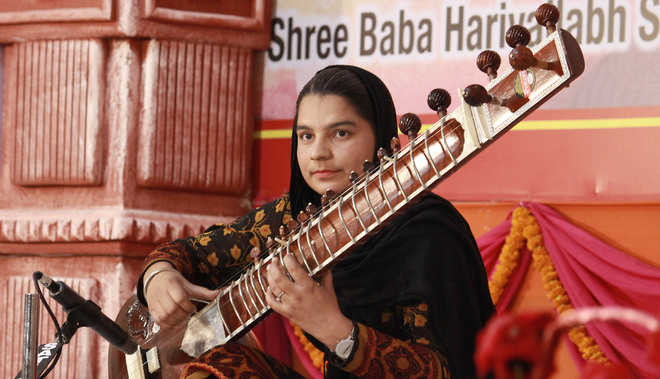Celestial chords mark Harivallabh pratiyogita
Aparna Banerji
Tribune News Service
Jalandhar, December 27
The 143rd Shree Baba Harivallabh Sangeet Sammelan has begun in the district amid acrobats, folk performers and traditional folk artistes congregating at the Devi Talab Mandir. During the four-day Harivallabh Sangeet Pratiyogita (competition) preceding the festival (which begins on Friday), over 200 music students and performers from across the country participated.
From Benares alone, which is the hub of country’s oldest music ‘Gharanas and families, a total of eight students have come to participate in the competition.
The “Pratoyogita” saw students giving out recitals in vocal as well as instruments like sitar, tabla, pkhawaj, sarangim, santoor, flute, among other instruments. Students from Uttar Pradesh, Madhya Pradesh, Gujarat, West Bengal, Bihar, Haryana, Andhra Pradesh among other states congregated at the event to showcase their talent.
While the contests are primarily held in three categories – Vocal, percussion and non-percussion, each of these categories saw performances by many students. As many as 136 participated in the senior category, a total of 136 participated in the junior categories.
Students from Pune, Ujjian, Benares, Vadodara, Kolhapur, Bilaspur, Muzaffarnagar, Mathura, Allahabad, Kolkata , Hooghly, New Delhi, Gurgaon, Haridwar, Haldwani, Jammu, Dharwad, among other cities, came to participate in the event.
Students participate in contests in three main categories — vocal, percussion and non-percussion in senior and junior categories. A total of 136 students participated in the senior category (48 in vocal khayal singing, 11 in vocal Thumri singing, 44 in percussion table, 8 in other percussion instruments and 25 in non-percussion category). A total of 77 students participated in the junior category (34 in vocal, 32 in percussion and 11 in non-percussion).
Jalandhar-based Tabla artist Pt Ramakant said: “While people say classical music is dying. The enthusiasm among artists who come here is the proof that the traditional music of the country is intact and thriving.”
Kartikeya Tiwari (20), a student from Benares, who competed in the Thumri contest said: “We have been taught that music comes from ‘Tapasya’ (meditation). The event is place where generations of our elders have paid homage. At least seven or eight of us from Benares – including percussionists, non-percussionists and vocalists came for the festival this year. We will listen to Pt Rajan Sajn Mishra tomorrow.”
Tutored by his father, a music Prof. Pt Navendranath Tiwari and grandfather Pt Sunredranath Tiwari, Kartikeya, a student of Delhi University plans to pursue vocal music as profession. He idolises Pt Channu Lal Mishra and Pt Partik Chaudhary from both of whom he has received lessons.
With the conluding day of the Prtiyogita today, the three-day Harivallabh Sangeet Sammelan will begin today.
While hundreds of scholars, participants, musicians and music afficionados from across the country congregated at the ‘sammlean’ from across the country and the world – during the Harivallabh – this year the ‘Sammelan’ has been marked by a unique initiative – Bazigars (acrobats) three of them passing across a single iron ring and the beat of dhol from performing artists greet visitors. Probably more than a century after the Harivallabh begin, has there been a serious attempt to emulate the age-old tradition which marked the festival’s earliest gatherings.
Up ahead is ‘Kashmiri Kahwa’, hot Indian desserts, spiritual books and a number of stalls showcasing handicrafts from different states.
While the initiative was announced by NZCC director ‘Saubhagyavardhan’ during the Harivallabh press conference a few days ago, it has come to fruition during the Harivallabh, in a bid to expand the festival as well as to provide a fillip to traditional arts of the region.
A total of 15 stalls have been out up on the Devi Talab premises while near the entry of the mandir—acrobats, bazigars and folk performers —dhadis, dholis and dancers perform from the morning till dusk. The committee members say while the “North Zone Cultural Centre, Patiala” has begin the initiative this year. In the forthcoming years, attempts to expand the same shall be made.
Results
Junior category (Vocal): First – Ridhima Bajpai, Raag Malkauns (Jammu), second – Saanchi Chauhan, Raag Tori (New Delhi), third Suramya Tripathi (Delhi).
Junior category (Non-percussion): First – Prakhar Joshi, flute (Nainital), second – Mridul Kapil, harmonium (Ambala), third – Rupali, Sitar (Jalandhar).
Junior category (Percussion): First – Anjishnu Mukherjee (Kolkata), second – Rishabh Sunder, Chandigarh and Urooj Hasan (Delhi), third Sahil Sidhu (Jalandhar) — all three played tabla.
Senior category (Vocal, Khayal/Dhrupad): First – Vramanti Sarkar, Raag Multani (Kolkata), second – Baswaraj, Raag Bihaag (Dharwad), third – Laj, Raag Maru Bihag (Hoshiarpur), Special Bhavya Sarswat, (Drupad in Raag Malkauns), New Delhi.
Senior category (Vocal,Thumri, Dadra, Tappa): First – Simranpreet Singh, Raag Mishra Sindu Bahiravi (Ambala), second – Ragini Deoley, (Raag Bhairavi), Ujjain, third – Vramanti Sarkar, (Raag Maanjh) Khamaj (Kolkata).
Senior category( Percussion, Tabla: First – Jaskaran Singh, (Kapurthala), second – Vishal Gori (Gujarat), third – Mansa Singh (Jalandhar).
Senior category (Percussion, Pakhawaj): First–Sidheshwari Dasopant Udalkar, (Pune), second – Akash Rajendra Tupe (Pune), third – Solanke Manoj Mahajan (Haridwar).
Bazigars, folk performers, handicrafts attractions for visitors this year
- While the word from the earliest of the Harivallabh observers is that back in the day when Baba Harivallabh had just started holding the ‘Sammelan’ to honour his guru Tuljagiri, folk performers dotted the periphery of the Devi Talab Mandir – then a huge open maidaan – even as a congregation of saints performed in the middle. Ages later, with a special joint initiative along with the North Zone Cultural Centre – the Harivallabh committee has again begun organising folk performances at the Devi Talab Mandir – the site of the three-day ‘sammelan’ which begins tomorrow.
.









